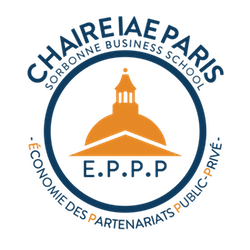Documents de Travail
Political Contestability and Contract Rigidity: An Analysis of Procurement Contracts
Numéro: 2015-2 Jean Beuve, Marian Moszoro and Stéphane Saussier – Political Contestability and Contract Rigidity: An Analysis of Procurement Contracts Abstract: We compare procurement contracts where the procurer is either a public agent or a private corporation. Using algorithmic data reading and textual analysis on a rich dataset of contracts for a standardized product and service from a single provider, we find…
Lire la suiteThe Permeability of Public Contracts: Evidence from Renegotiations in the French Car Park Sector
Numéro: 2015-1 Zoé Le Squeren and John Moore – The Permeability of Public Contracts: Evidence from Renegotiations in the French Car Park Sector Abstract: Recent research suggests that public and private agreements are inherently different. Public contracts should indeed be more permeable to the external (and, more specifically, the political) environment. This paper studies empirically the intrinsic differences between these two…
Lire la suiteWater LPEs in Cities: Three Case Studies
Numéro: 2014-13 Marianne Audette-Chapdelaine, Michael Klien et Maria Salvetti – Water LPEs in Cities: Three Case Studies Abstract: The failure or success of providing public services like drinking water through different institutional arrangements may depend crucially and in a non-trivial way from the administrative capacity. A strand of literature deals with this question and what administrative capacities are required for governments to…
Lire la suiteLocal Public Enterprises: A Taxonomy
Numéro: 2014-12 Stéphane Saussier et Michael Klien – Local Public Enterprises: A Taxonomy Abstract: Local public enterprises (LPE) represent a popular mode of public service delivery in OECD countries. In Europe, where the use of LPEs is particularly pronounced, local governments use not only public enterprises integrated into the administration but also 16,000 legally independent organizations, which they own at least…
Lire la suiteElections and project delivery in public work procurement: A red ribbon effect?
Numéro: 2014-11 Eshien Chong, Michael Klien et John Moore – Elections and project delivery in public work procurement: A red ribbon effect? Abstract: In this paper, we investigate the electoral cycle empirically using data on public work procurement in 1,634 French municipalities between 2005 and 2007. Using a difference-in-difference approach, we compare public work procurement of municipalities whose mayor was a candidate…
Lire la suiteProcedural Rules and their Impact on Procurement Outcomes: Evidence from France
Numéro: 2014-10 Anissa Boulemia et John Moore – Procedural Rules and their Impact on Procurement Outcomes: Evidence from France Abstract: For the last 20 years, a series of public procurement reforms has sought to enhance the efficiency of purchases by increasing public buyers’ discretionary power. Yet it has been argued that there is a lack of empirical results concerning the impact…
Lire la suiteRenégociation dans les PPP : risques et opportunités
Numéro: 2014-9 Jean Beuve, Aude Le Lannier et Zoé Le Squeren – La renégociation dans les PPPs : risques et opportunités Les PPPs présentent des spécificités qui font de leurs renégociations un sujet d’étude essentiel. Sources d’efficience par les nécessaires adaptations contractuelles qu’elles permettent ou au contraire d’inefficience de par leur nature opportuniste, les renégociations des contrats de PPPs recouvrent une…
Lire la suiteL’évolution des conditions de financement des contrats de PPP
Numéro: 2014-8 Frédéric Marty – L’évolution des conditions de financement des contrats de PPP Plan : Notre propos dans ce chapitre est de retracer les évolutions dans les montages financiers utilisés dans les contrats de PPP depuis les vingt dernières années et de mettre en exergue leur sensibilité aux conditions d’accès aux marchés des fonds prêtables. Nous montrons d’abord…
Lire la suiteLes outils de régulation des partenariats public-privé
Numéro: 2014-7 Lisa Chever et Aude Le Lannier – Les outils de régulation des partenariats public-privé Une première section de ce chapitre présentera les outils avancés, par la littérature théorique, pour sélectionner efficacement son partenaire. Ces mécanismes étant rarement suffisants pour garantir l’efficacité de la gestion du service sur toute la durée de vie du contrat, une…
Lire la suitePublic Private Partnerships and Efficiency: A Short Assessment
Numéro: 2014-6 Antonio Estache et Stéphane Saussier – Public Private Partnerships and Efficiency: A Short Assessment Abstract: Over the last 35 years or so, governements around the world have enhanced the participation of private actors to deliver a wide variety of goods and services, traditionally delivered by the public sector. The development of public-private partnerships (PPPs) has been, and continues to…
Lire la suite